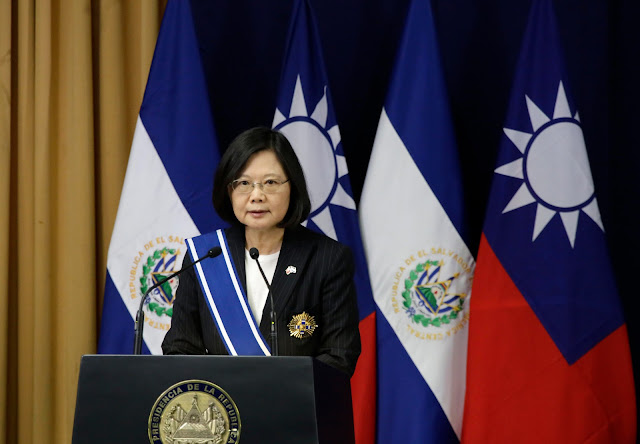
|
| Taiwanese President Ts'ai Ing-wen visits El Salvador, 2017 (official photo by the Presidency of El Salvador via ) |
On August 21 Taiwanese Foreign Minister Wu Chao-hsieh announced Taiwan's decision to sever diplomatic ties with El Salvador after the Central American country had asked Taipei for an "astronomical sum" of financial aid.
The statement came shortly after the end of Taiwanese President Ts'ai Ing-wen's visit to the United States, Paraguay and Belize. The trip had been deemed a success by Taiwan, but it had angered China.
On Tuesday El Salvador and China signed a joint communique on the establishment of diplomatic relations at a ceremony in Beijing. "The Government of the Republic of El Salvador recognizes that there is but one China in the world, that the Government of the People's Republic of China is the sole legal government representing the whole of China, and that Taiwan is an inalienable part of China's territory," the communique states.
Wu Chao-hsieh accused China of luring away Taiwan's allies with the promise of economic aid. El Salvador and Taiwan had had diplomatic ties since 1933, but the Central American nation had reportedly been in talks with Beijing on the possibility of switching diplomatic recognition.
In reaction to El Salvador's decision President Ts'ai Ing-wen tweeted: "The end of our diplomatic relations with El Salvador will not be the end of Taiwan’s engagement with the world. We have shown again and again that Taiwan will not bow to pressure. Our freedom & democracy will stand strong."
The end of our diplomatic relations with El Salvador will not be the end of Taiwan’s engagement with the world. We have shown again and again that Taiwan will not bow to pressure. Our freedom & democracy will stand strong. Full statement: https://t.co/eFsCeDukSH pic.twitter.com/bTwgvNTa6k— 蔡英文 Tsai Ing-wen (@iingwen)
China regards Taiwan as part of its territory and has not renounced the use of force to bring about "reunification". President Ts'ai Ing-wen, who was elected in 2016, rejects Beijing's "reunification" agenda and has vowed to maintain the status quo of de facto Taiwan independence.
Since Ts'ai took office in 2016, China has stepped up its efforts to isolate Taiwan. After El Salvador's defection, Taiwan has but 17 diplomatic allies in the world - the lowest number in history.
In the 1970s Taiwan lost one ally after another to China. On December 15, 1978, the United States switched diplomatic recognition from Taiwan to China. That year Taiwan had only 22 allies left.
In 1992, during the presidency of Lee Teng-hui, the number had increased to 30. But by 2013 Taiwan had once again only 22 diplomatic allies.
Since 2016, five countries have switched ties to China: Sao Tome and Principe, Panama, the Dominican Republic, Burkina Faso, and now El Salvador.
China is now allegedly eyeing Taiwan's last diplomatic ally in Africa: eSwatini (formerly known as Swaziland).
According to reports, on August 22 Chen Xiaodong, Chinese Assistant Minister of Foreign Affairs, said at a meeting that China was expecting eSwatini to switch diplomatic relations to Beijing soon.
eSwatini's Foreign Minister has denied that the African nation intends to sever ties with Taiwan.
Taiwan's Foreign Minister called the rumours a "phony issue" and said that ties between Taiwan and eSwatini are strong. “I just had lunch with Eswatini Foreign Minister Chief Mgwagwa Gamedze to talk about how to deepen our bilateral relations,” Wu told reporters on Wednesday.
Comments
Post a comment